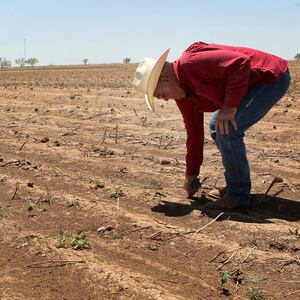SAN DIEGO—Joe Del Bosque never stops thinking about food. He can’t afford to stop thinking about it.
When you make your living from something, and you support yourself and your family from it, that commodity is always on your mind. You worry about whether you’ll be able to supply what is demanded, and whether there will be demand for what you supply.

Joe Del Bosque
Courtesy of Joe Del BosqueDel Bosque—who grows asparagus, almonds, cherries, cantaloupes, and sweet corn on his farm in the Central California town of Firebaugh, west of Fresno—also never stops thinking about a group of people to which, I dare say, most Americans never give a thought, in good times or in bad: farm workers.
ADVERTISEMENT
I’ve done the same, even though as a country mouse who grew up in the rich farmland of the San Joaquin Valley, I know a fair share about farming and the hard-working folks who toil in those fields to feed the nation.
I know that these folks are so good at what they do that—under the harshest and most unforgiving of conditions—they pick, package and produce enough surplus food to export it around the world.
I know that California—which has the fifth-largest economy in the world, and a GDP of $2.9 trillion—would shrivel up like a raisin in the sun without agriculture, and that agriculture here couldn’t survive without illegal immigrant labor.

I know that these jobs are the epitome of what George W. Bush used to refer to as “jobs that Americans won’t do,” and that this has less to do with how they pay than with how difficult and dirty they are, despite that pay.
I know that—particularly with regard to labor-intensive crops that require a steady and dependable workforce—the farm industry revolves around the father, son, and the holy ghost: farmers, labor contractors, and farm workers.
I know that Eastern media doesn’t usually think about farm workers until they write or film stories about the most damned, and that then they usually take the shortcut of relying on spin from the United Farm Workers Union.

Yet, despite what I know, I still don’t think much about farm workers. When I left home, I went to live in a half-dozen major cities. My neighbors and I depend on local supermarkets for our weekly food supply.
During the COVID-19 crisis, that’s a problem. For the last few weeks, I’ve thought about food almost as much as Del Bosque does. Since we’re responsible for feeding a family of five, my wife and I spend our day planning meals, debating whether to visit the grocery store, ordering groceries to be delivered—even if they won’t arrive for a week, and ordering takeout to fill the gaps.
With enough money to feed my family, I don’t have food insecurity. But I am definitely suffering from an acute case of food anxiety.
So I was in a vulnerable spot when a friend, and retired college professor, said to me recently: “Say, has anyone ever done an audit to figure out if we even have enough food in the country to feed all the people who live here?”
Not likely, according to the 71-year-old Del Bosque. The son of Mexican immigrants tells me that Americans have had it good for a long time.

Joe Del Bosque
Courtesy of Joe Del Bosque“All we have to do is go to the grocery store, and there’s all this fresh produce,” he said. “Most people never think about where that food comes from. It never occurs to them.”
Part of the answer is farm workers. They work to survive because there is no safety net for those who don’t work.
Del Bosque reminds me that, according to some estimates, as many as 70 to 80 percent of farm workers are undocumented. That means those workers aren’t eligible for welfare giveaways or unemployment benefits.
It also means many won’t be getting $1,200 checks from the federal government, as part of the $2 trillion stimulus package approved by the Coronavirus Aid, Relief and Economic Security, or CARES, Act.
It’s asparagus season. On Del Bosque’s farm, workers are out in the fields early in the morning harvesting the stalky vegetable. They stand about 10 feet apart from one another, he says. But the health risk starts long before they ever get to the fields. The main problem is the car ride to work, where seven or eight men might squeeze into a van. There is no social distancing there.

The workers will be out in the fields until mid-May. In late April, another 100 or so workers will roll into another section of the farm to pick cherries in a small window — about 10 days. In early June, it’ll be time to harvest sweet corn.
All that is likely to happen under the specter of COVID-19. Some workers are already wearing bandanas to cover their mouths, but maintaining a safe degree of social separation is a tall order.
The laborers listen to Spanish-language radio, or watch Spanish-language television. They know all about the pandemic. They don’t want to catch COVID-19, but they can’t afford not to be on the job. There’s no plan B.
“They’re working, and they’re happy,” Del Bosque says. “They’re happy to have a job. If they don’t work, they don’t eat. They’re very brave about it. We tell them to sneeze into their elbow, to wash hands, and to stay home if they’re sick.”
Some experts are suggesting the virus could be largely under control by July.

That’s good news for the farmer. His biggest cash crop is cantaloupes, and about 300 workers will descend onto the farm to pick those from the end of June to early October. With a crew that large, it’ll be nearly impossible for everyone to keep their distance. Besides, again, the real danger is the car rides.
With more time alone to reflect, people have started to speculate about what Americans will take away from this catastrophe.
I asked Del Bosque what he hoped people would learn from all this about farm workers.
“How essential they are,” he said. “When things get really bad like this, they’re there out in the fields. They’re always there. They work through all of this. And there is no one to replace them. They’re not appreciated. We should treat them like what they are – a very important part of the country.”
Listen to the man. Americans need to take better care of those who take good care of us. The next time you sit down for a meal and give thanks for the food on the table, remember to show a little gratitude for the heroes who put it there.






